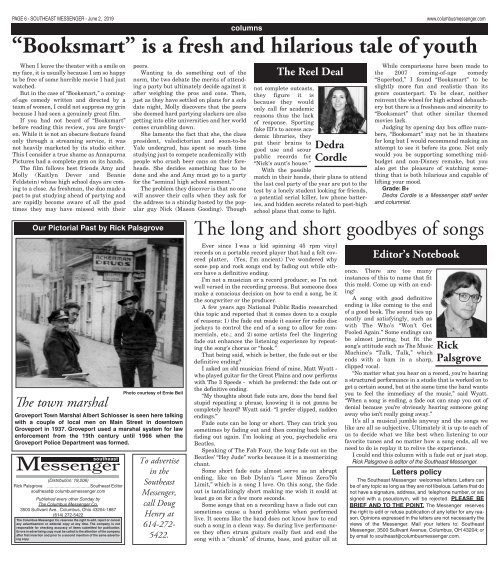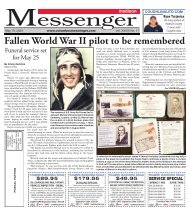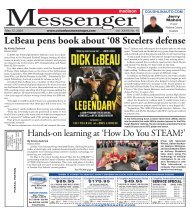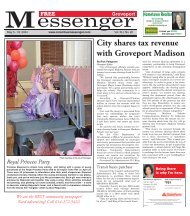Southeast Messenger - June 2nd, 2019
Create successful ePaper yourself
Turn your PDF publications into a flip-book with our unique Google optimized e-Paper software.
PAGE 6 - SOUTHEAST MESSENGER - <strong>June</strong> 2, <strong>2019</strong><br />
southeast<br />
<strong>Messenger</strong><br />
(Distribution: 19,206)<br />
Rick Palsgrove ...................................<strong>Southeast</strong> Editor<br />
southeast@ columbusmessenger.com<br />
Published every other Sunday by<br />
The Columbus <strong>Messenger</strong> Co.<br />
3500 Sullivant Ave., Columbus, Ohio 43204-1887<br />
(614) 272-5422<br />
The Columbus <strong>Messenger</strong> Co. reserves the right to edit, reject or cancel<br />
any advertisement or editorial copy at any time. The company is not<br />
responsible for checking accuracy of items submitted for publication.<br />
Errors in advertising copy must be called to the attention of the company<br />
after first insertion and prior to a second insertion of the same advertising<br />
copy.<br />
www.columbusmessenger.com<br />
columns<br />
“Booksmart” is a fresh and hilarious tale of youth<br />
When I leave the theater with a smile on<br />
my face, it is usually because I am so happy<br />
to be free of some horrible movie I had just<br />
watched.<br />
But in the case of “Booksmart,” a comingof-age<br />
comedy written and directed by a<br />
team of women, I could not suppress my grin<br />
because I had seen a genuinely great film.<br />
If you had not heard of “Booksmart”<br />
before reading this review, you are forgiven.<br />
While it is not an obscure feature found<br />
only through a streaming service, it was<br />
not heavily marketed by its studio either.<br />
This I consider a true shame as Annapurna<br />
Pictures had a complete gem on its hands.<br />
The film follows best friends Amy and<br />
Molly (Kaitlyn Dever and Beanie<br />
Feldstein) whose high school days are coming<br />
to a close. As freshman, the duo made a<br />
pact to put studying ahead of partying and<br />
are rapidly become aware of all the good<br />
times they may have missed with their<br />
Our Pictorial Past by Rick Palsgrove<br />
e town marshal<br />
peers.<br />
Wanting to do something out of the<br />
norm, the two debate the merits of attending<br />
a party but ultimately decide against it<br />
after weighing the pros and cons. Then,<br />
just as they have settled on plans for a solo<br />
date night, Molly discovers that the peers<br />
she deemed hard partying slackers are also<br />
getting into elite universities and her world<br />
comes crumbling down.<br />
She laments the fact that she, the class<br />
president, valedictorian and soon-to-be<br />
Yale undergrad, has spent so much time<br />
studying just to compete academically with<br />
people who crush beer cans on their foreheads.<br />
She decides something has to be<br />
done and she and Amy must go to a party<br />
for the “seminal high school moment.”<br />
The problem they discover is that no one<br />
will answer their calls when they ask for<br />
the address to a shindig hosted by the popular<br />
guy Nick (Mason Gooding). Though<br />
Photo courtesy of Ernie Bell<br />
Groveport Town Marshal Albert Schlosser is seen here talking<br />
with a couple of local men on Main Street in downtown<br />
Groveport in 1937. Groveport used a marshal system for law<br />
enforcement from the 19th century until 1966 when the<br />
Groveport Police Department was formed.<br />
To advertise<br />
in the<br />
<strong>Southeast</strong><br />
<strong>Messenger</strong>,<br />
call Doug<br />
Henry at<br />
614-272-<br />
5422.<br />
The Reel Deal<br />
not complete outcasts,<br />
they figure it is<br />
because they would<br />
only call for academic<br />
reasons thus the lack<br />
of response. Sporting<br />
fake ID’s to access academic<br />
libraries, they<br />
put their brains to<br />
good use and scour<br />
public records for<br />
“Nick’s aunt’s house.”<br />
With the possible<br />
Dedra<br />
Cordle<br />
match in their hands, their plans to attend<br />
the last cool party of the year are put to the<br />
test by a lonely student looking for friends,<br />
a potential serial killer, low phone batteries,<br />
and hidden secrets related to post-high<br />
school plans that come to light.<br />
Ever since I was a kid spinning 45 rpm vinyl<br />
records on a portable record player that had a felt covered<br />
platter, (Yes, I’m ancient) I’ve wondered why<br />
some pop and rock songs end by fading out while others<br />
have a definitive ending.<br />
I’m not a musician or a record producer, so I’m not<br />
well versed in the recording process. But someone does<br />
make a conscious decision on how to end a song, be it<br />
the songwriter or the producer.<br />
A few years ago National Public Radio researched<br />
this topic and reported that it comes down to a couple<br />
of reasons: 1) the fade out made it easier for radio disc<br />
jockeys to control the end of a song to allow for commercials,<br />
etc.; and 2) some artists feel the lingering<br />
fade out enhances the listening experience by repeating<br />
the song’s chorus or “hook.”<br />
That being said, which is better, the fade out or the<br />
definitive ending?<br />
I asked an old musician friend of mine, Matt Wyatt -<br />
who played guitar for the Great Plains and now performs<br />
with The 3 Speeds - which he preferred: the fade out or<br />
the definitive ending.<br />
“My thoughts about fade outs are, does the band feel<br />
stupid repeating a phrase, knowing it is not gonna be<br />
completely heard? Wyatt said. “I prefer clipped, sudden<br />
endings.”<br />
Fade outs can be long or short. They can trick you<br />
sometimes by fading out and then coming back before<br />
fading out again. I’m looking at you, psychedelic era<br />
Beatles.<br />
Speaking of The Fab Four, the long fade out on the<br />
Beatles’ “Hey Jude” works because it is a mesmerizing<br />
chant.<br />
Some short fade outs almost serve as an abrupt<br />
ending, like on Bob Dylan’s “Love Minus Zero/No<br />
Limit,” which is a song I love. On this song, the fade<br />
out is tantalizingly short making me wish it could at<br />
least go on for a few more seconds.<br />
Some songs that on a recording have a fade out can<br />
sometimes cause a band problems when performed<br />
live. It seems like the band does not know how to end<br />
such a song in a clean way. So during live performances<br />
they often strum guitars really fast and end the<br />
song with a “chunk” of drums, bass, and guitar all at<br />
While comparisons have been made to<br />
the 2007 coming-of-age comedy<br />
“Superbad,” I found “Booksmart” to be<br />
slightly more fun and realistic than its<br />
genre counterpart. To be clear, neither<br />
reinvent the wheel for high school debauchery<br />
but there is a freshness and sincerity to<br />
“Booksmart” that other similar themed<br />
movies lack.<br />
Judging by opening day box office numbers,<br />
“Booksmart” may not be in theaters<br />
for long but I would recommend making an<br />
attempt to see it before its gone. Not only<br />
would you be supporting something midbudget<br />
and non-Disney remake, but you<br />
also get the pleasure of watching something<br />
that is both hilarious and capable of<br />
lifting your mood.<br />
Grade: B+<br />
Dedra Cordle is a <strong>Messenger</strong> staff writer<br />
and columnist.<br />
The long and short goodbyes of songs<br />
Editor’s Notebook<br />
once. There are too many<br />
instances of this to name that fit<br />
this mold. Come up with an ending!<br />
A song with good definitive<br />
ending is like coming to the end<br />
of a good book. The sound ties up<br />
neatly and satisfyingly, such as<br />
with The Who’s “Won’t Get<br />
Fooled Again.” Some endings can<br />
be almost jarring, but fit the<br />
song’s attitude such as The Music<br />
Machine’s “Talk, Talk,” which<br />
ends with a bam in a sharp,<br />
clipped vocal.<br />
Rick<br />
Palsgrove<br />
“No matter what you hear on a record, you’re hearing<br />
a structured performance in a studio that is worked on to<br />
get a certain sound, but at the same time the band wants<br />
you to feel the immediacy of the music,” said Wyatt.<br />
“When a song is ending, a fade out can snap you out of<br />
denial because you’re obviously hearing someone going<br />
away who isn’t really going away.”<br />
It’s all a musical jumble anyway and the songs we<br />
like are all so subjective. Ultimately it is up to each of<br />
us to decide what we like best when listening to our<br />
favorite tunes and no matter how a song ends, all we<br />
need to do is replay it to relive the experience.<br />
I could end this column with a fade out or just stop.<br />
Rick Palsgrove is editor of the <strong>Southeast</strong> <strong>Messenger</strong>.<br />
Letters policy<br />
The <strong>Southeast</strong> <strong>Messenger</strong> welcomes letters. Letters can<br />
be of any topic as long as they are not libelous. Letters that do<br />
not have a signature, address, and telephone number, or are<br />
signed with a pseudonym, will be rejected. PLEASE BE<br />
BRIEF AND TO THE POINT. The <strong>Messenger</strong> reserves<br />
the right to edit or refuse publication of any letter for any reason.<br />
Opinions expressed in the letters are not necessarily the<br />
views of the <strong>Messenger</strong>. Mail your letters to: <strong>Southeast</strong><br />
<strong>Messenger</strong>, 3500 Sullivant Avenue, Columbus, OH 43204; or<br />
by email to southeast@columbusmessenger.com.


















